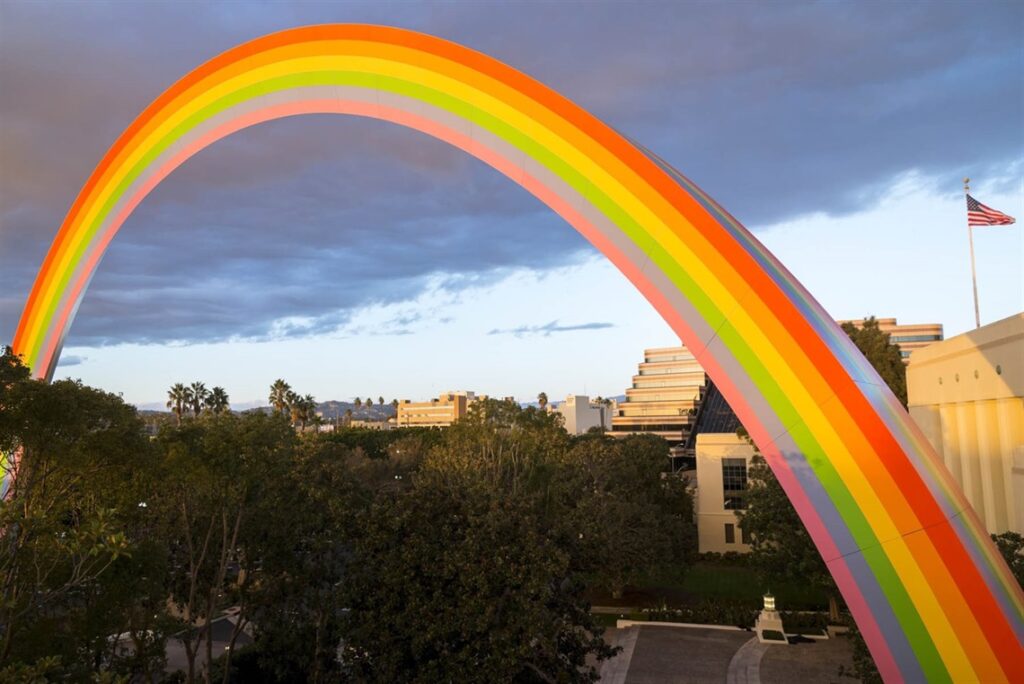In the realm of art, sculptures hold a unique position. They are not just static pieces but rather dynamic expressions of creativity and imagination. Among the myriad forms of sculptures, metal rainbow sculptures stand out as striking symbols of vibrancy and allure. These captivating creations not only adorn public spaces but also evoke a sense of wonder and fascination among onlookers. In this article, we delve into the world of metal rainbow sculptures, exploring their history, significance, and the artists behind these mesmerizing works of art.
The Origin of Metal Rainbow Sculptures
The concept of using metal to create rainbow sculptures is relatively modern, yet it draws inspiration from ancient traditions of metalworking and artistic expression. Metal, with its malleability and durability, provides artists with a versatile medium to bring their visions to life. The idea of crafting rainbows from metal speaks to humanity’s fascination with light, color, and the natural world.
The origins of metal rainbow sculptures can be traced back to the 20th century when artists began experimenting with unconventional materials and forms. As contemporary art movements gained momentum, artists sought to break away from traditional norms and explore new avenues of expression. This exploration paved the way for the emergence of metal rainbow sculptures as a distinct art form.
Symbolism and Significance
Metal rainbow sculptures carry rich symbolism, representing a myriad of themes and concepts. At its core, the rainbow is a universal symbol of hope, diversity, and harmony. Its vibrant hues span across the spectrum, embodying the beauty of diversity and the promise of a brighter tomorrow.
In a world often plagued by division and strife, metal rainbow sculptures serve as poignant reminders of the importance of unity and inclusivity. By depicting the rainbow in metal, artists infuse the sculpture with a sense of permanence and resilience, transcending temporal boundaries to convey timeless messages of peace and acceptance.
Furthermore, metal rainbow sculptures often serve as landmarks or focal points within urban landscapes, enhancing the aesthetic appeal of public spaces while fostering a sense of community and belonging. Whether towering above city streets or nestled in tranquil parks, these sculptures invite viewers to pause, reflect, and appreciate the beauty that surrounds them.
The Artistry Behind Metal Rainbow Sculptures
Creating a metal rainbow sculpture requires not only technical skill but also a keen artistic vision. Artists meticulously plan and execute each step of the process, from conceptualization to fabrication, ensuring that the final piece embodies their intended message and aesthetic.
The fabrication of a metal rainbow sculpture typically begins with the selection of suitable materials. Stainless steel, aluminum, and bronze are commonly used due to their durability and ability to withstand outdoor conditions. Once the materials are chosen, the artist employs a variety of techniques, including welding, bending, and shaping, to bring the sculpture to life.
One of the most challenging aspects of creating a metal rainbow sculpture is achieving the desired color effect. Artists may use specialized techniques such as anodizing or powder coating to achieve vibrant, long-lasting hues that mimic the natural beauty of a rainbow. Each color is carefully applied, layer by layer, until the sculpture radiates with the brilliance of a true rainbow.
Notable Metal Rainbow Sculptures Around the World
Across the globe, metal rainbow sculptures grace public spaces, serving as beacons of inspiration and wonder. Here are a few notable examples:
“The Ribbon of Light” – Chicago, USA: Designed by renowned artist Yvette Mattern, “The Ribbon of Light” is a monumental metal rainbow sculpture that spans the Chicago River. Composed of steel and LED lights, the sculpture illuminates the night sky with its vibrant colors, captivating viewers and transforming the urban landscape.
“Arc-en-Ciel” – Paris, France: Nestled in the heart of Paris, “Arc-en-Ciel” stands as a symbol of unity and diversity. Created by French sculptor Jean-Pierre Raynaud, the sculpture consists of intricately welded steel panels that form a shimmering rainbow arch, inviting passersby to bask in its radiant glow.
“Rainbow Connection” – Sydney, Australia: Perched atop a hill overlooking Sydney Harbour, “Rainbow Connection” is a striking metal sculpture created by Australian artist Michael Snape. Composed of stainless steel and coated in vibrant enamel, the sculpture celebrates the city’s cultural diversity while offering panoramic views of the iconic skyline.
“Rainbow Gate” – Reykjavik, Iceland: Located in downtown Reykjavik, “Rainbow Gate” is a whimsical metal sculpture crafted by Icelandic artist Ólöf Nordal. Constructed from recycled steel beams, the sculpture forms a colorful archway that serves as a popular gathering spot for locals and tourists alike.
Conclusion
In a world often overshadowed by darkness and uncertainty, metal rainbow sculptures offer a glimmer of hope and optimism. Through their vibrant colors and symbolic imagery, these captivating works of art inspire us to embrace diversity, foster unity, and celebrate the beauty that surrounds us. As we continue to navigate the complexities of the modern world, let us draw inspiration from these radiant beacons of creativity and resilience, striving to build a brighter future for generations to come.







